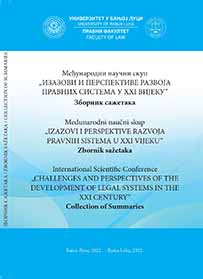КОХАБИТАЦИЈА У ДРЖАВАМА СА ПАРЛАМЕНТАРНИМ СИСТЕМОМ ВЛАСТИ И (НЕ)ФУНКЦИОНИСАЊЕ ЕГЗЕКУТИВЕ
COHABITATION IN COUNTRIES WITH A PARLIAMENTARY SYSTEM OF GOVERNMENT AND (NON)FUNCTIONING OF THE EXECUTIVE
Author(s): Milan PilipovićSubject(s): Law, Constitution, Jurisprudence, Constitutional Law, Civil Law, International Law, Law and Transitional Justice, Governance
Published by: Правни факултет Универзитета у Бањој Луци
Keywords: cohabitation; president of the republic; government; constitution; parliamentary system; Croatia; Macedonia; foreign policy;
Summary/Abstract: The term cohabitation refers to the occurrence of political coexistence between the president of the republic and the prime minister who belong to different and opposing political options. In such situations, the question arises of the functioning of the executive power, in the sense of the efficient and coordinated action of the president of the republic and the government, as two heads of the executive. The term cohabitation, in literature, is associated with the French semi-presidential system of government. However, analyzing the constitutional norms on the position of the president of the republic and the constitutional-political practice in the parliamentary countries of the region, in a situation where the directly elected president of the republic belonged to one political option, and the government and the parliamentary majority consisted of another political option, the author believes that the concept of cohabitation, in its theoretical meaning, can also be used in republics with a parliamentary system of government. This was shown and analyzed on the example of the Republic of Croatia and the Republic of North Macedonia, where cohabitation existed several times.
Journal: Зборник радова Међународни научни скуп „Изазови и перспективе развоја правних система у XXI вијеку"
- Issue Year: 2022
- Issue No: 2
- Page Range: 185-204
- Page Count: 20
- Language: Serbian

